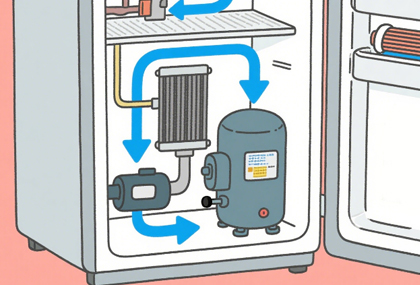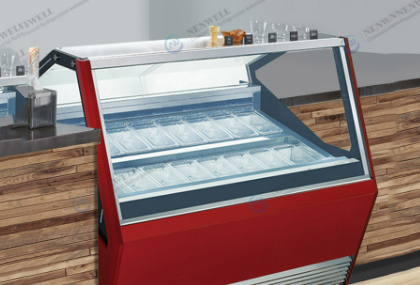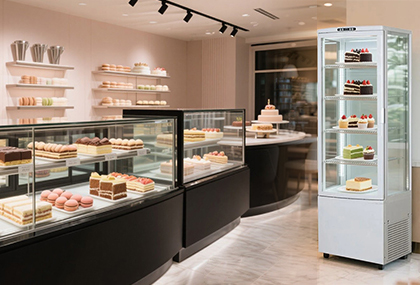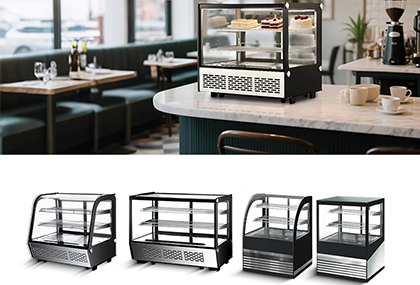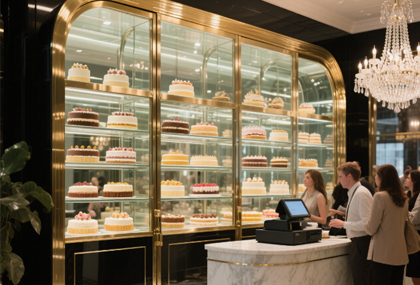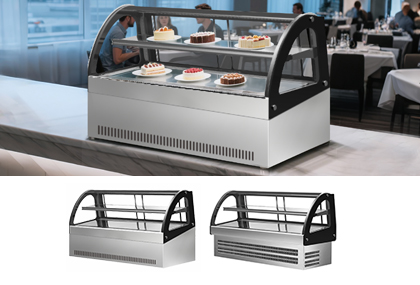How to choose a desktop cake supplier?
Based on Cooluma's years of experience, selecting a desktop cake cabinet supplier requires comprehensive evaluation of multiple factors, including professionalism, reputation, and pricing. A supplier that typically meets user requirements with reasonable pricing is the optimal choice.
Ⅰ. Experience
The essence of a high-quality wholesaler lies in their ability to match scenario-specific demands, rather than mere years of experience. This can be validated through three dimensions:
Scenario adaptation example
The service can provide customized solutions for various scenarios: installing LED-lit display refrigerators with tiered shelves in mall food sections, configuring compact energy-efficient units for coffee shops, or meeting bespoke sizing requirements for bakeries (notably, industry standards require non-returnable custom products). This demonstrates the ability to understand the core requirements of 'display + freshness preservation + space optimization' for table-top cake cabinets.
Stable supply chain status
Ask them about their response cycle for peak season replenishment and equipment after-sales service, such as whether they can provide order delivery data for the past 1-2 years (such as average delivery time and replenishment success rate) to avoid the impact of supply chain fracture on business.
Problem-solving experience
The most telling evidence of expertise lies in addressing common pain points: when tackling issues like "how to resolve condensation on glass doors" or "adjusting energy consumption for different climate zones", providing concrete solutions—such as recommending models with automatic defogging features—demonstrates hands-on experience.

Ⅱ. Focus on the ability to interpret technology and requirements
Wholesaler's technical advantages are evaluated from three aspects:
Professional product parameter interpretation
The key specifications of a desktop refrigerator include temperature control (standard range 2-8℃), cooling method (direct cooling vs air cooling scenarios), material safety (compliance with stainless steel inner liner and tempered glass), and energy efficiency rating.
Wholesalers need to be able to clearly explain: "Air-cooled is suitable for frequent access (uniform temperature without dead corners), direct cooling is more energy efficient but requires regular defrosting" this kind of targeted analysis, rather than just listing parameters.
Level of mastery of certification and standards
Authorized equipment must obtain safety certifications such as UL/ETL (North America) and CE (European Union). For domestic sales, it must also comply with the GB 4706 series of refrigeration equipment safety standards. Wholesalers should proactively provide certification documents and explain the specific application scenarios for each certification (e.g., differences between export and domestic standards).
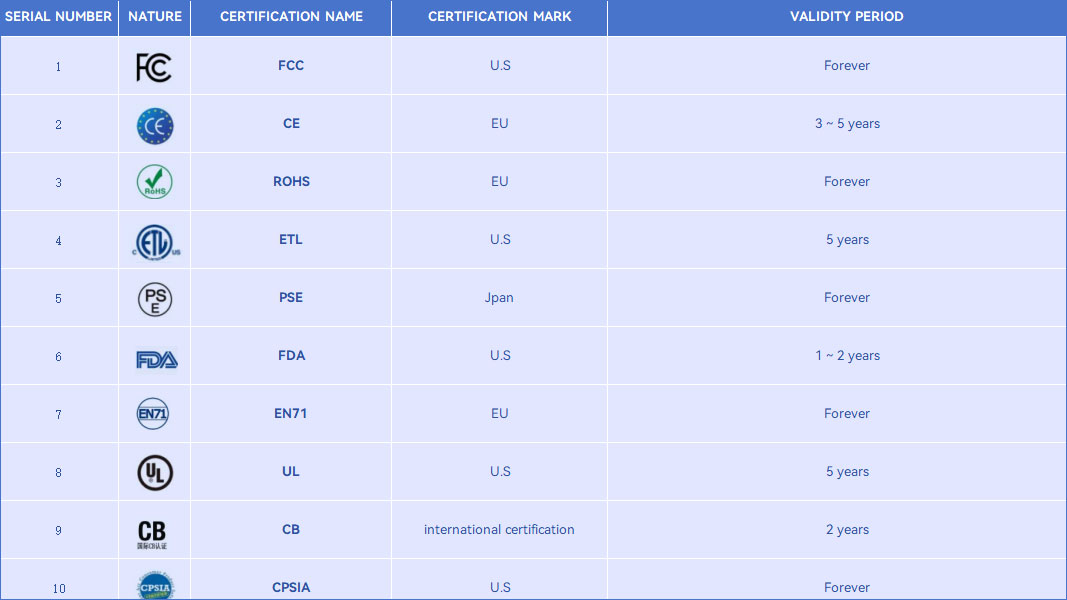
Customization request response logic
When customers request features like 'adjustable cabinet depth for wall-mounted placement' or 'additional tiered shelves', professional wholesalers don't just agree. They first conduct evaluations:' Will insufficient depth compromise cooling efficiency? 'and' Will extra shelves disrupt airflow?' This demonstrates their respect for product functionality.
III. Relying on industry recognition and neutral evaluation
Authority needs to be verified through a third-party perspective to avoid relying on its own publicity:
Positioning in the industry ecosystem
Check if it is a member of the cold chain equipment industry association or has participated in relevant standard discussions (the list can be checked through the industry's official website); monitor whether other wholesalers or retailers have cited its technical materials (such as equipment maintenance guidelines).
Build reputation on neutral platforms
Check user ratings on B2B platforms like Made-in-China, focusing on concrete metrics such as 'equipment failure rate' and 'after-sales response speed'; or consult the local baking industry association to gauge its reputation among peers (avoid relying solely on a single customer's subjective recommendation).
Stability of long-term cooperation
If the wholesaler can provide long-term cooperation with a regional supplier (such as a continuous supply record of more than 3 years), it can reflect the industry trust in quality and performance.
IV. Transparency and after-sales guarantee as the cornerstone
Credibility is the bottom line of cooperation, which needs to be verified through details:
1.Transparency of information disclosure
Proactively disclose the actual energy consumption (not theoretical values) of the device, along with the replacement cycle and cost of vulnerable components (such as sealing strips). Clearly state key terms like "customized products are not eligible for returns or exchanges" and "warranty does not cover human-induced damage," rather than concealing restrictive conditions.
2.Traceability of the after-sales system
The written post-sales process must include: fault response timelines (e.g., providing solutions within 24 hours), maintenance personnel qualification certificates (refrigeration equipment repair certificates), and spare parts supply cycles (stock availability of core components like compressors). Past after-sales cases (with customer information withheld) may be randomly inspected to verify the completeness of handling records.
3.Open verification of enterprise credit
Check the business status through the National Enterprise Credit Information Publicity System, with special attention to 'administrative penalty records' and 'contract dispute losses.' For foreign trade wholesalers, the customs credit rating can also be verified.
4.Value for money
Compared with the same industry, the cake cabinet has a high cost performance. It is not only the price, but also the result of comprehensive consideration of product performance, energy efficiency grade, after-sales service response speed and spare parts replacement cost.
The timing should weigh the initial purchase price and the long-term maintenance cost, and give priority to the models with reasonable overall design, verifiable core components and high maintenance convenience, so as to avoid the increase of subsequent operating costs caused by the compression of configuration due to low price.
The essence of selecting a wholesaler lies in finding partners who "understand cake preservation requirements and know the pain points of business scenarios." Experience ensures they "have seen the problems," professionalism ensures they "can solve the problems," authority ensures they "are recognized," and credibility ensures they "won't cause trouble." These four elements are interconnected, ultimately pointing to one core: wholesalers provide not just equipment, but also trust in users.
Most popular More «
-
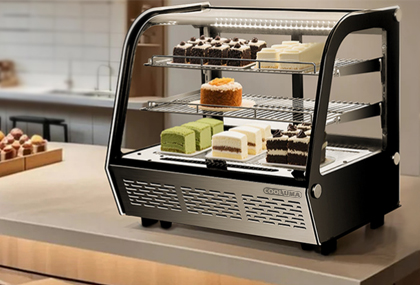
Cooluma Best Countertop Cake Refrigerator
-
Commerical Bread Cabinet First-Time Use Step-by-Step Guide
-
How to choose a desktop cake supplier?
-
Ideal temperature and temperature control points of cake cabinet
-
Which Cooluma compact commercial cake display cabinet is the best?
-
What are the procedures required for the certification of food display cabinets?
-
Aims to be a global supplier of commercial cold chain equipment, Cooluma
-
Best Automatic Refrigerated Display Cabinet Series
-
Is Cooluma a Professional Cold Chain Equipment Service Provider?
-
Where Lies the Value of the Best Cake Display Showcase?





